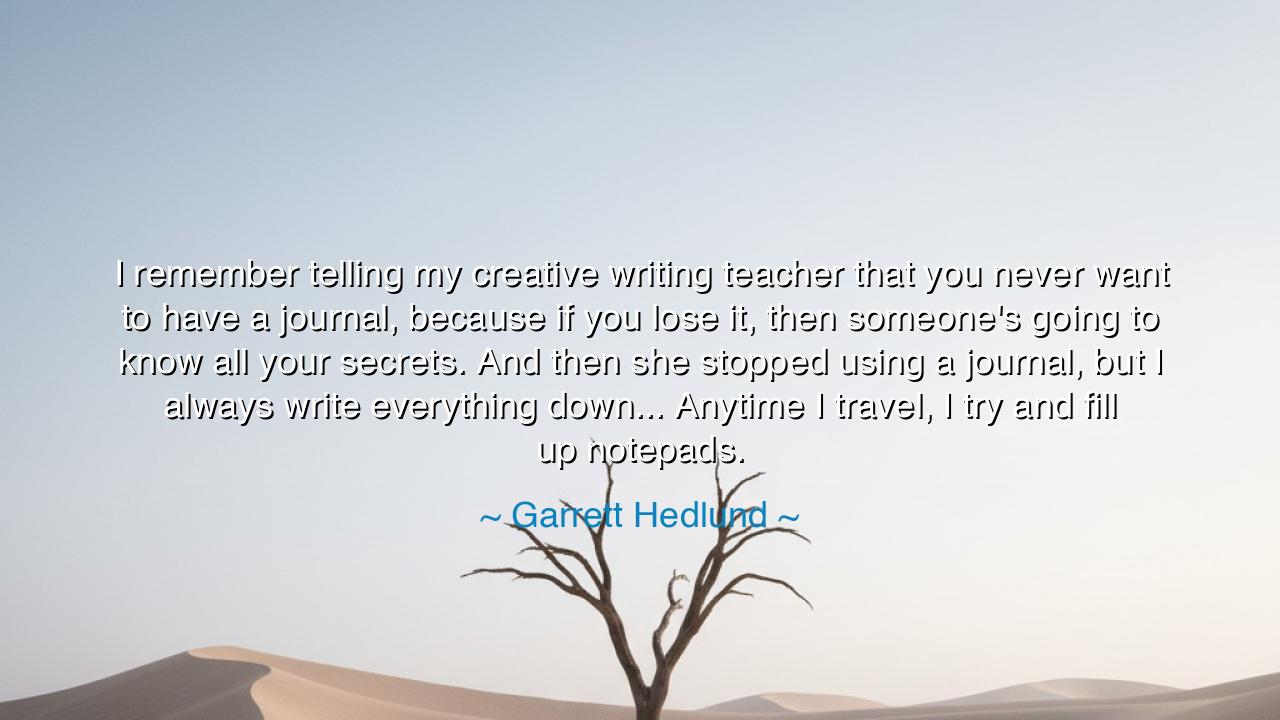
I remember telling my creative writing teacher that you never
I remember telling my creative writing teacher that you never want to have a journal, because if you lose it, then someone's going to know all your secrets. And then she stopped using a journal, but I always write everything down... Anytime I travel, I try and fill up notepads.






“I remember telling my creative writing teacher that you never want to have a journal, because if you lose it, then someone’s going to know all your secrets. And then she stopped using a journal, but I always write everything down… Anytime I travel, I try and fill up notepads.” Thus spoke Garrett Hedlund, not only of the practice of writing, but of the eternal struggle between secrecy and revelation, between the fear of exposure and the necessity of remembrance. His words touch upon the paradox of the human heart: that we long to hide our secrets, yet also yearn to set them down, to preserve them against the passing of time.
When Hedlund warns against the keeping of a journal, he reveals a truth as old as the written word itself. To write is to expose, to capture the whispers of the soul upon fragile paper, where any stranger’s eye might one day trespass. The act of writing, then, is both bold and perilous—it is the revealing of one’s inner world to a future unknown. And yet, he admits, he could not abandon this practice. For what is life without memory? What is travel without the record of wonder? To live without writing is to let the river of experience flow away without a trace. To write is to anchor the river, to give shape to the chaos of days.
History itself rests upon such contradictions. Consider the scrolls of Marcus Aurelius, who in his Meditations poured forth his most private reflections. He did not intend them for the eyes of the world; yet the world received them, and for centuries they have guided emperors, scholars, and common men. His secrets, captured in ink, became treasures of wisdom for all humanity. So too did Anne Frank, in her hidden journal, preserve the voice of a soul trapped in history’s darkest hour. Her words, once dangerous to possess, have become immortal testimony to hope amid despair. What was once a secret has become a beacon.
Thus, Hedlund’s tale reminds us of the twofold power of writing. It is both dangerous and divine. A lost journal may betray the heart; yet a journal preserved may outlast its author, carrying truth to generations unborn. To write is to gamble with immortality. What one fears as shameful revelation may, in time, be exalted as wisdom. The ancients inscribed their triumphs and laments upon stone so that they might endure beyond flesh. Today, paper serves the same eternal hunger: the hunger to be remembered.
There is also in his words the spirit of travel. He speaks of filling notepads as he journeys, of catching fleeting impressions before they vanish. For the road is like a dream: vivid in the moment, yet fragile in memory. Only by writing does the dream survive. In this way, Hedlund teaches that to write while traveling is not only to preserve sights and sounds, but to preserve the soul itself as it wandered, curious and alive. It is not the buildings, nor the oceans, nor the mountains alone that endure in the journal—it is the man who saw them, felt them, and was changed by them.
And so, what lesson do we take from this paradox? It is this: do not let fear of exposure silence your voice. Write your truths, record your journeys, inscribe your heart upon the page. Yes, there is risk—that another may one day see. But the greater risk is that your life will pass, and nothing of it will remain. The wise do not seek only safety; they seek meaning. And meaning is born from memory, preserved in words.
Therefore, let each of you keep your own journal. Fill its pages with thoughts, dreams, doubts, and triumphs. Guard it, but do not fear its discovery. For even if the world one day looks upon your secrets, perhaps they will not judge, but learn. Perhaps your words, like those of Aurelius or Frank, will be the spark that lights another soul. And even if no eye but yours ever reads them, you will have lived twice: once in experience, and once in remembrance.
So write, even when you are afraid. Record, even when you feel small. For the world is fleeting, but words endure.






AAdministratorAdministrator
Welcome, honored guests. Please leave a comment, we will respond soon